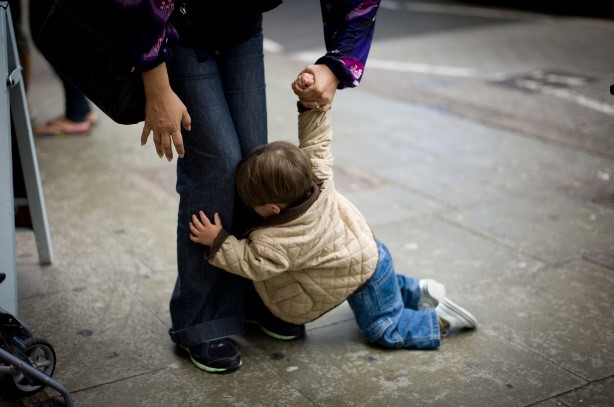
Emotions play a large role in challenging behaviors since young children can easily become overwhelmed by their feelings. We’ve all seen or experienced moments when a child is so consumed with emotion that they can’t control themselves. Imagine a 2 year old having a meltdown in the middle of the grocery store when her mom tells her that she can’t have a lollipop. To her, this is a BIG DEAL. She doesn’t understand why she can’t have it; she just understands that her mom is denying her something that she really wants.
Older children are able to keep their emotions and thinking in balance. They can regulate and express their feelings in appropriate ways. Young children, on the other hand, haven’t mastered this skill. Emotions are more dominant in their brains because their cognitive/thinking part of the brain isn’t fully developed yet. Their emotions are closer to the surface!

Behaviors all serve a purpose. A child who is experiencing a strong emotion may feel the need to express themselves or self-soothe. Behaviors that we may find challenging may be internally rewarding for children, meaning, they may help the child cope with their unpleasant feelings. For example, an anxious child may rock back and forth and hum loudly. An adult may find this disruptive or rude, but on the child is comforted by the feeling they get from this behavior.
While you may understand this in theory, it’s a whole different story to remember this when your child is demonstrating a challenging behavior. Let’s talk about how to manage situations when your child’s behavior is the result of their overwhelming emotions…
Show Empathy When a toddler becomes upset, it’s important to first empathize. Restate what the child is communicating to show that you understand. Too often, parents and caregivers try to have their young child problem solve or apologize when they haven’t calmed down yet. In these instances, the child is too overwhelmed with their feelings to process anything else. It is best to allow the child to regulate their emotion before addressing what is going on. Waiting and allowing the child to become calm can lead to the most successful outcome.

Address the Issue After the child feels they are understood and have calmed down, then try to address the issue and bring closure. Verbally communicating, “I know you’re sad that I have to go to work. I’m sad that I don’t get to spend the day with you too. But I’ll see you tonight.” Even if your child is too young to understand what these words mean, they will learn to become comforted by your soothing tone and touch.
Additional Resources
- Check out this video to learn six strategies for helping your child cope with his emotions!
- Read this article about managing your own emotions as a parent
- In this audiobook, The Whole Brain Child, Daniel J. Siegel and Tina Payne Bryson discuss practical tips for helping your child learn emotional regulation
- https://www.zerotothree.org/resources/326-toddlers-and-challenging-behavior-why-they-do-it-and-how-to-respond
